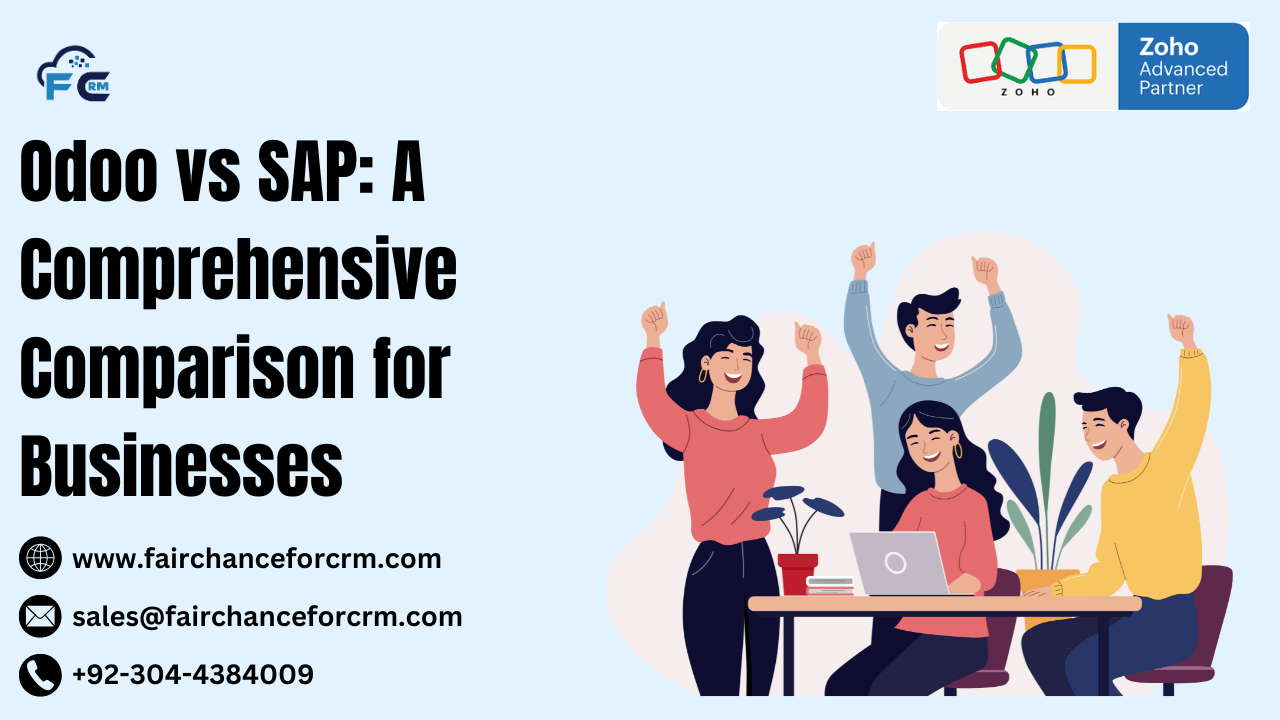When it comes to managing business operations through ERP systems, two major players often come up in discussions: Odoo vs SAP. Both are powerful tools designed to streamline business processes, but they cater to different kinds of businesses and have distinct features. In this article, we will compare Odoo and SAP, examining their strengths and weaknesses, and help you determine which solution might be best for your organization.
Also Read:
- Maximizing Customer Engagement with Odoo Email Marketing
- Leveraging Odoo WhatsApp Integration for Enhanced Communication and Customer Engagement
- Zoho Flow How To Extract Webhook Data | FAIRCHANCE FOR CRM
- Zoho Deluge How To Check If Something Is Null | FAIRCHANCE
- Autofill Field Zoho CRM Deals – FAIRCHANCE FOR CRM
Odoo vs SAP – Complete Guidance
What is Odoo?
Odoo is an open-source ERP platform that provides a suite of business applications to help companies manage various aspects of their operations. These include modules for sales, inventory management, accounting, manufacturing, HR, CRM, and more. Odoo is highly modular, meaning businesses can start with a few apps and add more as their needs grow. It’s known for its flexibility, ease of customization, and scalability, especially for small to medium-sized businesses.
Key Features of Odoo:
- Modular Design: Odoo is made up of different modules that businesses can use based on their needs (e.g., sales, accounting, CRM).
- Open Source: Odoo’s community edition is open-source, which allows for customization and cost savings.
- User-Friendly Interface: Known for an intuitive, easy-to-use interface.
- Customization: Offers the ability to customize features through Python and XML, making it suitable for businesses with specific needs.
- Cloud and On-Premise Options: Businesses can choose to host Odoo on their own servers or opt for the cloud-based version.
Example Use Case for Odoo:
A mid-sized manufacturing company uses Odoo to manage its entire workflow. The company integrates the inventory, HR, accounting, and manufacturing modules to streamline its operations, automate tasks, and gain real-time insights into their processes.
What is SAP?
SAP (Systems, Applications, and Products in Data Processing) is a global leader in ERP software. SAP offers a comprehensive suite of enterprise software solutions for large organizations, focusing on industries like manufacturing, finance, and supply chain management. SAP’s flagship product, SAP S/4HANA, is a real-time enterprise resource planning suite built on an in-memory database, providing high-speed data processing capabilities.
Key Features of SAP:
- Comprehensive ERP Solution: SAP covers a wide range of business processes, from supply chain management to finance, HR, and production.
- Integration: Seamless integration of modules allows businesses to manage all operations under one roof.
- Scalability: SAP is highly scalable and suitable for large enterprises with complex requirements.
- Advanced Reporting and Analytics: SAP offers powerful tools for data analytics, reporting, and business intelligence.
- Cloud and On-Premise Options: SAP offers both cloud and on-premise solutions, allowing businesses to choose the best deployment model for their needs.
Example Use Case for SAP:
A multinational corporation in the automotive industry uses SAP to manage its global supply chain, financial reporting, and human resources. The company integrates various SAP modules such as SAP S/4HANA, SAP Ariba, and SAP SuccessFactors to streamline its operations and ensure real-time visibility across departments.
Odoo vs SAP: Key Differences
| Feature | Odoo | SAP |
|---|---|---|
| Primary Focus | Modular ERP solution for small to medium-sized businesses | Comprehensive ERP solution for large enterprises |
| Customization | Highly customizable with Python, XML, and open-source flexibility | Highly customizable, but requires specialized expertise and resources |
| Ease of Use | Intuitive interface, designed for ease of use | Complex interface, typically requires training |
| Target Market | Small to medium-sized businesses (SMBs) | Large enterprises and multinational corporations |
| Deployment | Cloud and on-premise options | Primarily cloud-based and on-premise |
| Cost | Generally lower, especially with the open-source community edition | Higher initial cost, typically with licensing fees and implementation costs |
| Scalability | Scalable, but best suited for growing SMBs | Highly scalable, designed for large organizations |
| Implementation Time | Faster implementation due to its modular nature | Longer implementation timelines due to complexity and size |
| Reporting & Analytics | Basic to moderate analytics capabilities | Advanced reporting, analytics, and business intelligence tools |
FAQs
1. Which is better for small businesses, Odoo vs SAP?
Odoo is generally a better fit for small and medium-sized businesses due to its affordability, ease of use, and flexibility. SAP, on the other hand, is designed for large enterprises with complex requirements, making it less ideal for small businesses.
2. Can Odoo be scaled to handle large enterprises?
Yes, Odoo is scalable and can be used by larger organizations. However, its main strength lies in supporting small to medium-sized businesses. For very large companies with highly complex needs, SAP might be a better fit.
3. What is the cost difference between Odoo and SAP?
Odoo’s open-source community edition is free, but you will incur costs for additional modules, cloud hosting, or enterprise versions. SAP, however, requires significant upfront costs for licensing, implementation, and ongoing support, making it a much higher investment for businesses.
4. How long does it take to implement Odoo and SAP?
Odoo has a relatively faster implementation timeline compared to SAP, which requires more time due to its complexity, customization, and integration needs. Odoo can take weeks to a few months to implement, whereas SAP implementations may take several months or even years for large enterprises.
5. Is Odoo open-source?
Yes, Odoo offers an open-source version (Odoo Community), which allows for flexibility and customization. The Odoo Enterprise version, however, comes with additional features and support but requires a subscription.
6. What are the main industries that benefit from SAP?
SAP is ideal for large enterprises in industries like manufacturing, retail, finance, energy, pharmaceuticals, and logistics, as it provides highly specialized modules for these sectors.
Conclusion: Which One Should You Choose?
Both Odoo vs SAP are powerful ERP systems, but they serve different kinds of businesses. Here’s a quick breakdown of which platform might be best for you:
- Choose Odoo if: You are a small to medium-sized business looking for a flexible, cost-effective, and user-friendly ERP solution. Odoo’s modular nature, open-source option, and ease of customization make it ideal for businesses with specific needs that want to avoid complex implementations.
- Choose SAP if: You are a large enterprise with complex business operations that require an all-encompassing ERP system. SAP is designed for large corporations that need advanced reporting, analytics, scalability, and integration across multiple business functions.
Conclusion
Odoo vs SAP, In conclusion, Odoo offers an ideal solution for businesses looking for an affordable, customizable ERP system, while SAP is better suited for large organizations with complex needs and resources to invest in extensive implementations. Choosing the right ERP depends on the size of your business, your specific industry needs, and your budget.
For more information about the Odoo vs SAP, visit this link.
If you want to Free Trail Zoho, click on this link.




